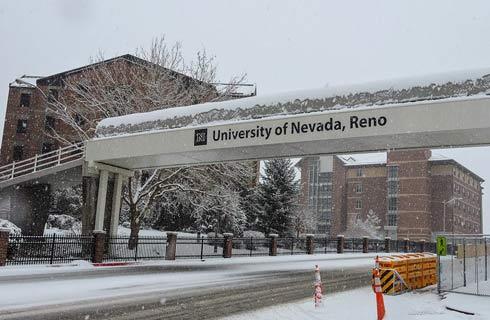Master of Science in Geological Engineering

学历文凭
Masters Degree

专业院系
地质工程

开学时间

课程时长

课程学费

国际学生入学条件
Students must hold
- Bachelor’s degree or recognized equivalent from an accredited institution
- Eligibility for admission with a 3-year bachelor's degree are determined on a case by case basis
- Minimum grade point average (on a 4.0 scale): 2.75 for a master’s degree
- Minimum score requirements: TOEFL: 550 (paper) or 79 (internet), IELTS: 6.5 (academic version).
Application Deadlines: Jan 1 (Fall) | Spring: Sept 15
IDP—雅思考试联合主办方

雅思考试总分
6.5
了解更多
- 雅思总分:6.5
- 托福网考总分:79
- 托福笔试总分:550
- 其他语言考试:Pearson (PTE): 59, Cambridge: 176, Duolingo: 105
CRICOS代码:
申请截止日期:请 与IDP联系 以获取详细信息。
课程简介
The program is designed to enhance students’ knowledge and abilities in engineering and the geological sciences. Although often equated with geotechnical engineering, a discipline closely aligned with civil engineering, geological engineering is more correctly characterized as a program focused on geologic hazards mitigation and natural resources characterization. <br>The MS program emphasizes the professional nature of the geological engineering discipline. Consequently, students are required to be excellent in both geology and engineering core subjects. If they are deficient in the core courses they must be taken. Geological engineering plays a vital role in engineering with natural materials (rock, soil, water and even snow). Geological engineers are intimately involved with our environment in assessing and designing ways to alleviate the effects of geologic hazards like landslides, earthquakes, floods and volcanic eruptions or by mitigating or mediating potential man-made hazards including contaminated ground water and poorly sited landfills. They design foundations for structures, tunnels and open pits for large excavations. Geological engineers design facilities for mitigating the flow of groundwater pollution, for the location of sanitary municipal landfills and for the storage of hazardous waste.<br>Today, there is a critical national need for geological engineers in the heavy construction industry, the minerals industry, the energy industry, and for fundamental research at national laboratories. On graduating, a GE is capable of being professionally registered as an engineer on passing the relevant State Examinations<br><br>The student learning outcomes include:<br>Students will be able to:<br>read and critically evaluate relevant scientific literature in the specific topic area of the advanced geologygeological engineeringgeophysics sub discipline studied.<br>demonstrate an advanced level of competency and mastery in the specific topic area of their thesis.<br>discuss the relationship of the specialized area of geologygeological engineeringgeophysics studied in their thesis in the broader context of the field and Earth Sciences in general.<br>produce and communicate professional products, reports, and presentations that address the chosen topic or research in the specific topic area of their thesis.
相关申请

预科

奖学金

实习机会

在校学习

跨境学习

校园授课-线上开始

在线/远程学习
本校相关课程
Master of Music in Music Education

学历文凭
Masters Degree
下一个开始日期
课程费用总额
Master of Arts in Music

学历文凭
Masters Degree
下一个开始日期
课程费用总额
Bachelor of Arts in Women's Studies

学历文凭
Bachelor Degree
下一个开始日期
课程费用总额
Bachelor of Science in Wildlife Ecology and Conservation

学历文凭
Bachelor Degree
下一个开始日期
课程费用总额
Bachelor of Science in Veterinary Science

学历文凭
Bachelor Degree
下一个开始日期
课程费用总额
Doctor of Philosophy in Speech Pathology

学历文凭
Ph.D.
下一个开始日期
课程费用总额
其他相关课程
Master of Science in Civil Engineering Plan B (non-thesis) - Geoengineering

科罗拉多州立大学
泰晤士高等教育世界大学排名:

学历文凭
Masters Degree
下一个开始日期
课程费用总额
Master of Science in Geoengineering

明尼苏达大学双城分校
泰晤士高等教育世界大学排名:

学历文凭
Masters Degree
下一个开始日期
课程费用总额
Bachelor of Science in Geological Engineering

阿拉斯加大学费尔班克斯分校
泰晤士高等教育世界大学排名:

学历文凭
Bachelor Degree
下一个开始日期
课程费用总额
地质工程哲学博士

俄克拉荷马大学
泰晤士高等教育世界大学排名:

学历文凭
Ph.D.
下一个开始日期
课程费用总额
Master of Geoengineering

明尼苏达大学双城分校
泰晤士高等教育世界大学排名:

学历文凭
Masters Degree
下一个开始日期
课程费用总额
土木与环境工程哲学博士-地质工程

威斯康星大学麦迪逊分校
泰晤士高等教育世界大学排名:

学历文凭
Ph.D.
下一个开始日期
课程费用总额




